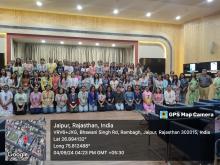Field Visit to Santokba Durlabhji Hospital, Jaipur

The Department of Psychology organized a session on “Bridging theory and practice: A psychiatrist’s perspective” in collaboration with the Department of Psychiatry. SDMH Hospital led an enlightening discussion with over 100 students, gathered to explore the integration of academic knowledge with practical skills in psychiatry.
Dr. Pankaj Mittal highlights the significance of diagnosis and how it is directly dependent on factors such as age, occupation, etc. He clarified the difference between psychiatry and psychology and how their collaboration treats psychological problems. He further discusses psychiatry subspecialties like addiction, geriatrics, forensic adolescence, and pediatrics and how they are important in psychiatry. He emphasizes the role of the psychiatrist in integrating clinical expertise by building a strong therapeutic alliance and fostering trust and communication between the psychiatrist and patient. Understanding patients’ perspectives like empathy and active listening, cultural sensitivity, and patient-centered care are crucial. He explained the various aspects of translating theoretical concepts into practical interventions like CBT, appropriated medication, and other lifestyle interventions for treating patients. He shares valuable insights and case studies with real-life examples for a better understanding, along with discussing challenges and opportunities in bridging theory and practice. He also guided the National Mental Health Survey 2015-16 by NIMHANS and Mental Healthcare Act 2017 guidelines for clinical psychologists’ roles. Finally, he concluded the session by guiding how mental health professionals can provide holistic and individual care, promoting patient recovery and wellbeing.
Further, the session ended with a question and answer and a vote of thanks by Dr. Himangini Rathore Hooja, Director, Behavioral School. SDMH management thanked all the participants and faculties for attending the session along with a group photograph and serving of refreshments.
Outcome:
The students learned to explore real world challenges in psychiatric practice and were enlightened by a meaningful discussion which was incredibly valuable for them. Students get aware of the legal guidelines to be followed and abided by in the profession of Psychiatry and Psychology.

